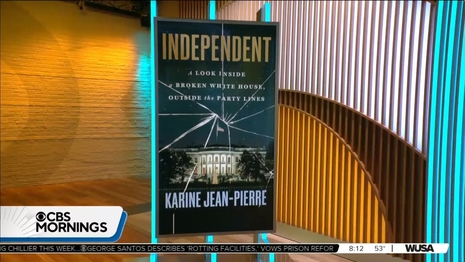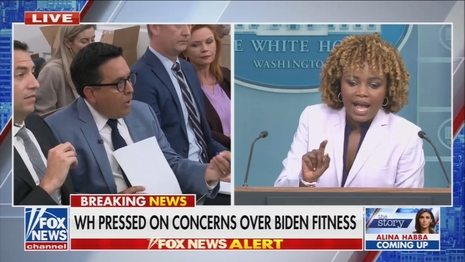 For years, Biden White House Press Secretary Karine Jean-Pierre was arguably the most reliable source of entertainment for NewsBusters (and viral posts on X). Her press briefings were a heavyweight bout with the English language. And, when she announced in June she would be writing a book called Independent about having left the Democrat Party, we made a promise we’d read it and fill it with Post-It notes.
For years, Biden White House Press Secretary Karine Jean-Pierre was arguably the most reliable source of entertainment for NewsBusters (and viral posts on X). Her press briefings were a heavyweight bout with the English language. And, when she announced in June she would be writing a book called Independent about having left the Democrat Party, we made a promise we’d read it and fill it with Post-It notes.
That time has come and it’s far worse than predicted. Jean-Pierre’s book broke no new ground on the inner workings of the White House. Rather, she offered meandering, repetitive excuses for President Biden and denied his cognitive decline. Overall, she penned 172 pages of texts that were comical, insipid, scatterbrained, sloppy, and vapid.
As others have noted in reviews and Jean-Pierre had said in interviews, she saw nothing cognitively wrong with Biden and rather saw a Democrat Party that both “abandon[ed]” and “betray[ed]” a man with “no scandals,” while also “haz[ing] Harris” that kept a “trailblazing, extremely accomplished” woman from the White House.
In essence, she argued, America and the Democrat Party failed black women and were uniquely important to our country’s canvass. Why? Because the country had shown an aversion to “repay[ing] what it owes us” for having built the country.
But her sanctimoniousness started from the dedication: “To those who refuse to sit quietly — May this book remind you that politics isn’t a game played by others, but a compass we each hold in our hands.”
Since this is a media blog, we’ll focus on what she had to say about the liberal media, which she denied were leftists: “[T]hough the GOP often accuses the press of being overwhelmingly liberal, slightly more than half of American journalists say they are independents, according to a 2022 ‘American Journalist’ survey by professors at Indiana University.”
Speaking to distrust in the national press, Jean-Pierre blamed it on “misinformation and disinformation circulated by right-wing forces” but also the White House press corps’ own “belligerent” attitude.
Jean-Pierre whined early in the book that “the press had taken every opportunity to imply Biden was too old or mentally unfit for the job, and I braced for the narrative they’d spin after” the fateful debate.
“All the reporters wanted to talk about was Biden’s age. They were waiting for something to happen because they were looking for something to happen, and the debate performance became their proof,” she huffed.
She had plenty to say about Fox’s Peter Doocy, including a September 3, 2024 exchange in which he called out Kamala Harris’s code-switching between audiences. Jean-Pierre argued she had to pitch a fit because “my connection to Harris transcended politics” as “two Black women” in power and Doocy’s “disingenuous” questions contained “a thread of racism.”
Showing her purposeful ignorance, Jean-Pierre said code-switching was no different than “sipping a pint of beer at a neighborhood pub.”
Despite that, Jean-Pierre insisted she “got along” with Doocy, who “would often check in with me and reassure me that he was just doing his job” with the tough questions, which she said “I appreciated[.]”
Another moment was the July 9, 2024 briefing when she “was floored” CNN’s M.J. Lee “tried to trip me up” by simply asking if, in retrospect given Biden’s debate performance, she had regretted her September 2022 statements defending Biden’s mental ineptitude calling out to a dead Republican Congresswoman.
Jean-Pierre was incensed years-old statements were fair game and somehow spun her bumbling answers into a girl boss moment (click “expand”):
I told them Walorski had simply been “top of mind for Biden since she had been one of the lawmakers whose efforts led to the health and nutrition conference. Fast forward to post-debate 202 when Lee asked if I still wanted to stick with that answer. Was that what the president actually said, or did I now want to take it back?
I was floored. Despite the many months that had passed, I happened to remember that day clearly. I’d gone to the Oval Office before my daily briefing and Biden said verbatim the three words I later relayed to the press. So, no, I told Lee, I wasn’t retracting an answer I’d given in 2022. She went silent, even shrank a bit into her seat. But I was annoyed. Lee was trying to lure me into a gotcha moment, implying that I couldn’t be trusted to give accurate information. That kind of accusatory tone, that undermining of my credibility, was constantly throughout my two and half years in the top job.
 A third post-debate briefing she highlighted was the July 8, 2024 rumble with CBS’s Ed O’Keefe over the administration’s lack of transparency concerning a neurologist’s secret White House visit. Jean-Pierre said O’Keefe’s “attacks on me were so heated and personal” as he wasn’t satisf[ied]” with her word salads about privacy.
A third post-debate briefing she highlighted was the July 8, 2024 rumble with CBS’s Ed O’Keefe over the administration’s lack of transparency concerning a neurologist’s secret White House visit. Jean-Pierre said O’Keefe’s “attacks on me were so heated and personal” as he wasn’t satisf[ied]” with her word salads about privacy.
Describing O’Keefe as a “smoldering” individual with questions that struck “a low blow,” Jean-Pierre hid behind MSNBC’s The Last Word host Lawrence O’Donnell, who offered a commentary that night calling O’Keefe “not very good at the respect thing” and were thus handing Trump the White House.
Try and not laugh at this rant claiming the White House press were anti-Biden, but were pro-Trump (click “expand”):
He concluded with a warning: When the press behaves unprofessionally, it can hinder the flow of truth to an electorate that desperately needs to be well-informed.
(....)
I appreciated what O’Donnell said, and not only because he spoke up for me. The mainstream press has an overwhelming responsibility to counter the conspiracies, mistruths, and trolling that are operating in overdrive. But at times they are part of the problem, escalating falsehoods and spin, like The New York Times implying that the President was seeing a neurologist when he wasn’t. And beyond the animosity some reporters directed my way, they also frequently disrespected the president. They would yell questions after he gave remarks as he walked to Air Force One and pretty much any other time he was within earshot. That was in marked contrast to the dference showen to Trump on the campaign trail and during his first term, when many reporters waited patiently to be called on, stood quietly as Trump rambled on, and routinely allowed Trump’s lies to stand without a fact-check or follow up.
It was what I called the Trump double standard, splashed in our faces once again during his second term.
There was more: “At least since the era of Spiro Agnew...the GOP has unfairly accused the mainstream media of having a left-wing bias. In response, too many news organizations have twisted themselves into knots trying to prove they aren’t predisposed to progressives, resulting in them grilling Democrats....while softballing conservatives.”
But as part and parcel of this book’s perpetual flip-flopping, she would pull further on this thread to only change her mind pages later, and again a few pages after that (click “expand”):
That capitulation became particularly dangerous when it evolved to a “both sides” framing that normalized the behavior of an increasingly authoritarian Republican Party, acting as though its actions were comparable to what was being done by Democrats. They weren’t.
(....)
Belief in the media has dramatically diminished in no small part because Trump has spent the past decade smearing the press as an enemy of the people, dubbing any story that highlights his lies or crimes as “fake news.” It’s an accusation brandished by authoritarians throughout history.
(....)
In the midst of such vindictiveness from the Trump administration, the news business also faces tremendous financial pressures. The emergence of free news sites in the early 200s got people used to not paying for information, but journalism is an industry like any other that needs profits for its shareholders and revenue to pay its staff and to fund its work. Advertising...has also migrated online, resulting in many news organizations consolidating, laying off large numbers...or shutting down all together.
Without naming them, Jean-Pierre spilled ink kvetching over the New York Post’s Steven Nelson and White House colleagues John Kirby and Anita Dunn.
Painting herself as a victim constantly “bullied” for being a black “queer” woman, Jean-Pierre said she declared it a “Machiavellian” effort she constantly had to shake off with numerous stories emerging about her incompetence with the “known right-wing paper” leading the way with the “most outrageous” one alleging she was unprepared for briefings.
Jean-Pierre addressed this on multiple occasions, relaying she “spent ours each day doing research” with 13 people assisting her so she “never approached the lectern unprepared.”
Explaining she learned “the person who was planting pieces on me” was a “she” and “should have been my mentor,” she vented how “it was painful to learn that this person was personally leading an effort...relentlessly smearing me behind my back” when Dunn, as a fellow woman, should have had her back.
Jean-Pierre offered no concrete explanations for why White House staff wanted her out, but she nonetheless farcically claimed it was because of “my independence” and that Dunn, as an older white woman, could no longer control her once she became Biden’s lead spokeswoman.
Showing how disjointed her book was, she changed her mind over 50 pages later by conceding “I wasn’t at the top of my game right out of the gate” and took “months” realizing “I absolutely needed to find my sea legs,” “anticipat[e] some of the questions I might be asked,” and realize she had to offer corrections.
But by the very next page, she declared the attacks unfair because she, unlike predecessor Jen Psaki, was a black lesbian and thus had to “void the ‘angry Black woman’ trope.” She provided no evidence, but insisted “black people...intuitively understood” her predicament.
And therein sat the problem with nearly every page, passage, or thought in this book.
In chapter after chapter, she would provide no evidence to support her analysis or jabs. In explaining the negative stories, she settled on racism because that was the best she “came up with.”
At other moments, Jean-Pierre would voice a thought, but immediately cast it aside for a separate tangent or even contradict herself.
Jean-Pierre claimed to be an independent, but ruled out ever voting third-party or for a Republican. She claimed there are good people on the right, but then argued they shouldn’t be seen as friends because they don’t “believe you or loved ones have a right to exist.” She extolled Biden’s preparation, but blamed his debate performance on everything from a cold to jet lag to Hunter Biden’s conviction.
Simply put, Jean-Pierre’s book should have never made it past the first line of edits.





